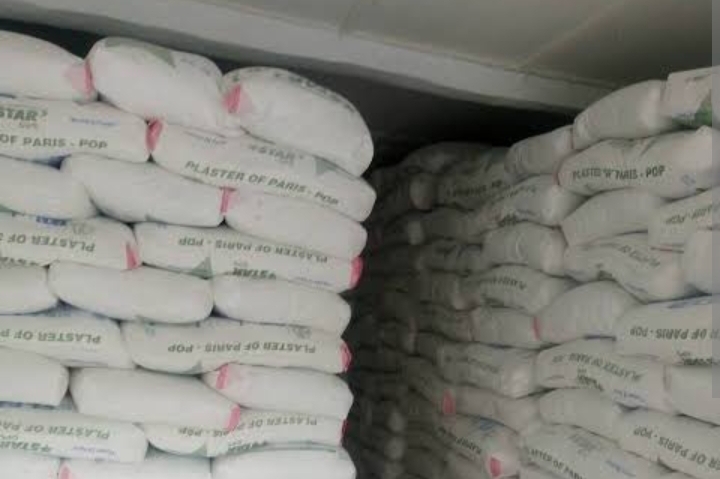Pop Cement price in Nigeria
Nigeria’s construction industry has been rapidly evolving, and one material that has significantly contributed to this transformation is Pop Cement. Short for Plaster of Paris, Pop Cement has emerged as a popular choice among builders, architects, and contractors due to its unique properties and applications. In this article, we will explore the definition and overview of Pop Cement, its importance and applications in Nigeria, the various types available, and the numerous advantages it offers to the construction sector.
Plaster of Paris, commonly known as Pop Cement, is a versatile and lightweight building material made from gypsum. The process of manufacturing Pop Cement involves heating gypsum to a specific temperature, which causes it to lose its water content and form a fine white powder. This powder, when mixed with water, reverts to a solid state, making it an excellent material for crafting intricate designs and moldings in construction projects.
Table of Contents
Importance and Applications in Nigeria
Pop Cement holds immense importance in the Nigerian construction landscape due to its diverse applications. It finds extensive usage in both residential and commercial projects, including interior and exterior decorations, false ceilings, wall plastering, and artistic moldings. The ease of handling and ability to create intricate designs have made it a popular choice among artisans and craftsmen, enabling them to showcase their creativity while adding aesthetic value to buildings.
Types of Pop Cement Available in Nigeria
In Nigeria, various types of Pop Cement are available to cater to different construction needs. The most common types include standard Pop Cement and reinforced Pop Cement. Standard Pop Cement is ideal for interior decorations, such as creating decorative molds, cornices, and ceiling designs. On the other hand, reinforced Pop Cement is reinforced with glass fibers, enhancing its strength and making it suitable for external applications like facade designs and outdoor sculptures.
Advantages of Pop Cement in Nigerian Construction
A. Durability and Longevity
One of the primary advantages of Pop Cement in Nigerian construction lies in its durability and longevity. When properly mixed and applied, Pop Cement exhibits excellent resistance to wear, tear, and weathering. Structures adorned with Pop Cement designs have been known to withstand the test of time, making it a cost-effective investment for long-term projects.
B. Versatility and Design Flexibility
Pop Cement stands out for its unparalleled versatility and design flexibility. Builders and architects can mold it into any desired shape, allowing for the creation of intricate patterns and decorative elements that breathe life into a building’s interior and exterior. Its ability to adapt to various architectural styles has enabled it to blend seamlessly into both modern and traditional designs.
C. Cost-effectiveness and Affordability
In a nation where cost-effectiveness is a crucial factor in construction, Pop Cement emerges as a budget-friendly option. Its raw materials are readily available and reasonably priced, making it an affordable choice for both small-scale and large-scale projects. Furthermore, its ease of application reduces labor costs, contributing to significant savings in the overall construction process.
Challenges and Limitations of Pop Cement Usage
A. Availability and Distribution Issues:
1. Limited Local Production: One of the major challenges faced with pop cement in Nigeria is the limited local production capacity. The majority of pop cement products are imported, leading to supply chain disruptions and higher costs due to import duties and transportation expenses.
2 Uneven Distribution: The distribution of pop cement products is often uneven, with urban centers having better access compared to rural areas. This disparity can hinder construction projects in remote regions and lead to inflated prices in underserved locations.
3 Fluctuating Prices: Due to the dependence on imports and other external factors, the prices of pop cement in Nigeria can be volatile, making it challenging for contractors and builders to plan and execute projects within budget.
B. Environmental Concerns:
Non-renewable Resource: Pop cement is manufactured from gypsum, a non-renewable mineral. The extraction and processing of gypsum can lead to habitat destruction and ecological imbalance in mining areas.
Energy Consumption: The production process of pop cement requires significant energy inputs, contributing to greenhouse gas emissions and adding to Nigeria’s carbon footprint.
Waste Generation: Improper disposal of pop cement waste can lead to environmental pollution. Moreover, unused or expired pop cement may end up in landfills, exacerbating the waste management problem.
C. Quality Control and Counterfeit Products:
Lack of Standardization: Nigeria faces challenges in maintaining strict quality control standards for pop cement products. Inconsistent quality can lead to compromised structural integrity and safety concerns.
Counterfeit Products: The popularity of pop cement has attracted counterfeit manufacturers, flooding the market with substandard and potentially dangerous products. These counterfeit goods pose significant risks to buildings and human health.
Weak Regulatory Oversight: The absence of robust regulatory oversight in the construction sector exacerbates the problem of counterfeit pop cement products. This allows unscrupulous producers to operate with little fear of consequences.
Where can I buy pop cement in Nigeria
1. Pop Cement Shop in Lagos.
address is 33, Ikorodu Road, Lagos. They are open from 8am to 5pm from Monday to Saturday.
2. Popcrete in Lagos. Their address is 1, Ajose Adeogun Street, Victoria Island, Lagos. They are open from 8am to 6pm from Monday to Saturday.
3. Lafarge in Lagos. Their address is 1, Ligali Ayorinde Street, Victoria Island, Lagos. They are open from 8am to 6pm from Monday to Saturday.
You can as well buy pop cement online from a number of retailers, such as Jiji.ng, Jumia.com.ng, and Konga.com.ng.
Price of pop cement in Nigeria
Brand Price per bag
ABS ₦9,500
Lafarge. ₦10,000
Diamond ₦10,500
Sunflag ₦11,000
Frequently asked questions and answers about pop cement in Nigeria
Q1: What is POP cement?
A1: POP (Plaster of Paris) cement is a type of building material used for interior plastering and decoration. It is a white powder made from gypsum, which is heated and then mixed with water to create a paste that can be applied to walls and ceilings.
Q2: What are the uses of POP cement in Nigeria?
A2: POP cement is commonly used in Nigeria for interior plastering of walls and ceilings in residential and commercial buildings. It is also used for decorative purposes, such as creating ornamental designs and moldings on walls and ceilings.
Q3: Where can I buy POP cement in Nigeria?
A3: POP cement is widely available in Nigeria and can be purchased from various building material stores, construction supply shops, and hardware outlets across the country.
Q4: Are there different types of POP cement available?
A4: Yes, there are different types of POP cement available, depending on the specific application. Some types include standard POP for general interior plastering, moisture-resistant POP for areas prone to dampness, and fast-setting POP for quick drying.
Q5: How do I mix POP cement?
A5: To mix POP cement, you need to add the powder to clean water in a mixing container and stir it thoroughly until you achieve a smooth and lump-free paste. The exact water-to-POP ratio may vary depending on the brand and type of POP cement, so it’s essential to follow the manufacturer’s instructions.
Q6: What is the drying time for POP cement?
A6: The drying time for POP cement can vary based on factors like temperature and humidity. Generally, it takes around 24 to 48 hours for POP cement to dry completely. It’s crucial to allow sufficient drying time before applying paint or any other finishing touches.
Q7: Can POP cement be used for exterior applications?
A7: No, POP cement is not suitable for exterior use as it is not weather-resistant. It can be damaged by exposure to rain and moisture, leading to structural issues. For exterior applications, alternative materials such as cement plaster or stucco are more appropriate.
Q8: Can I use POP cement for DIY projects?
A8: Yes, POP cement is commonly used for DIY projects, especially for interior wall and ceiling plastering. However, it is essential to follow proper instructions and safety guidelines while working with POP cement to achieve the desired results.
Q9: Can POP cement be used to repair cracks in walls?
A9: Yes, POP cement can be used to repair small cracks in walls. It is essential to clean the area thoroughly, apply the POP paste, and smoothen it to match the existing surface. For larger cracks or structural issues, it is advisable to consult a professional.
Q10: Is POP cement safe for health and the environment?
A10: POP cement is generally considered safe for use, but it is essential to handle it with care. During mixing, wear appropriate protective gear like gloves and a dust mask to avoid skin irritation and inhalation of dust particles. When disposed of properly, POP cement is not harmful to the environment.
Conclusion
Pop Cement has undoubtedly revolutionized the Nigerian construction industry, offering builders and architects a versatile and budget-friendly material to unleash their creativity and craft stunning designs. Its durability, design flexibility, and cost-effectiveness have positioned it as a preferred choice for both functional and decorative applications in residential and commercial projects. As Nigeria’s construction sector continues to grow, Pop Cement will continue to play a vital role in shaping the nation’s architectural landscape for years to come.

